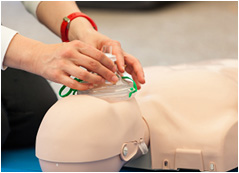Home Care: Chronic Disease Care
We work with families throughout our community to help create and implement a comprehensive care plan for managing a variety of chronic diseases and conditions including:
1. Stroke
The best strategy for controlling and preventing high blood pressure is to begin with lifestyle changes. This often means a combination of light exercise and medication.
The following strategies may include in the care plan:
- Meal preparation
- Medication reminders/set-up/ administration
- Development of a light exercise schedule
- Shopping
- Coordination of a healthy meal plan

2. Chronic obstructive pulmonary disease (COPD) and other chronic respiratory conditions e.g. Asthma
COPD / Asthma are respiratory problems that are most common reasons older people visit hospitals. With the help of our service, you can keep your COPE / asthma under control and have less emergency department visits and stays in the hospital.
The following strategies may include in the care plan:
- Medication reminders for prevention / relief purposes
- Cleaning up to avoid dust trigger
- Assisting the Consumer to assume a position of comfort (elevate the head of the bed, have consumer lean on an overbed table or sit on edge of the bed).
- Avoiding irritants: not being around smoke; be mindful of the weather - clean, warm and not too dry environment
- Increasing warm fluid intake to 3000 ml per day within cardiac tolerance
- Encouraging movement / activity
- Demonstrating effective coughing and deep-breathing techniques
- Encouraging abdominal or pursed-lip breathing exercises
- Encouraging a healthy weight having access weight on the consumer decreases the space for the lungs to expand.
- Bed positioning : turn Consumer every 2 hours

3. Diabetes
When a person has diabetes, either their body does not produce enough insulin, or it cannot use the insulin correctly, so glucose accumulates in the blood. High levels of blood glucose can cause a range of symptoms, from exhaustion to heart disease.
One way to control blood sugar is to eat a healthful diet. Generally, foods and drinks that the body absorbs slowly are best because they do not cause spikes and dips in blood sugar.
The following strategies may include in the care plan:
- Shopping
- Meal preparation
- Education of what affects blood glucose levels
- Coordination of a healthy meal plan
- Development of a light exercise schedule
- Medication reminders / set-up / administration
- Monitoring condition of skin and lower extremities to prevent skin breakdown, ulcers, and related injuries
- Ensuring proper oral hygiene to prevent gum disease (common in diabetics consumers)

4. Parkinson’s disease
Parkinson's disease (PD) is a neurodegenerative disorder. The cause remains largely unknown. Although there is no cure, treatment options vary and include medications and surgery. While Parkinson’s itself is not fatal, disease complications can be serious.
It is possible to maintain a good quality of life with PD. Our clinical professionals know just how to work with the muscle stiffness and tremors to prevent frustration and falls.
The following strategies may include in the care plan:
- Assistance with with prescribed exercise routine, mobility and transfer
- Provide transportation
- Respite for family carer relief
- Nutrition and Meal Planning
- Personal Supervision and Home Safety

6. Heart disease
Heart disease is Australia's leading single cause of death, with 18,590 deaths attributed to heart disease in Australia in 2017. Cardiovascular diseasegenerally refers to conditions that involve narrowed or blocked blood vessels that can lead to a heart attack, chest pain (angina) or stroke.
The following strategies may include in the care plan:
- Shopping
- Meal preparation to prepare a heart healthy diet
- Helping with the daily activities of living
- Assisting with physician-prescribed exercises

7. Osteoporosis
Osteoarthritis can lead to frustration, weariness and depression when a person can no longer perform simple, daily tasks with ease. But in most cases, people with osteoarthritis can lead full, active lives by properly managing the condition.
The following strategies may include in the care plan:
- Medication reminders
- Incontinence care to prevent skin irritations and infection
- Meal preparation to maintain nutrition
- Transportation to errands and medical appointments
- Engaging or calming activities
- Assisting with exercise regimen to reduce depression and anxiety
- Cognitive-behavioral therapy (CBT) and emotional support


